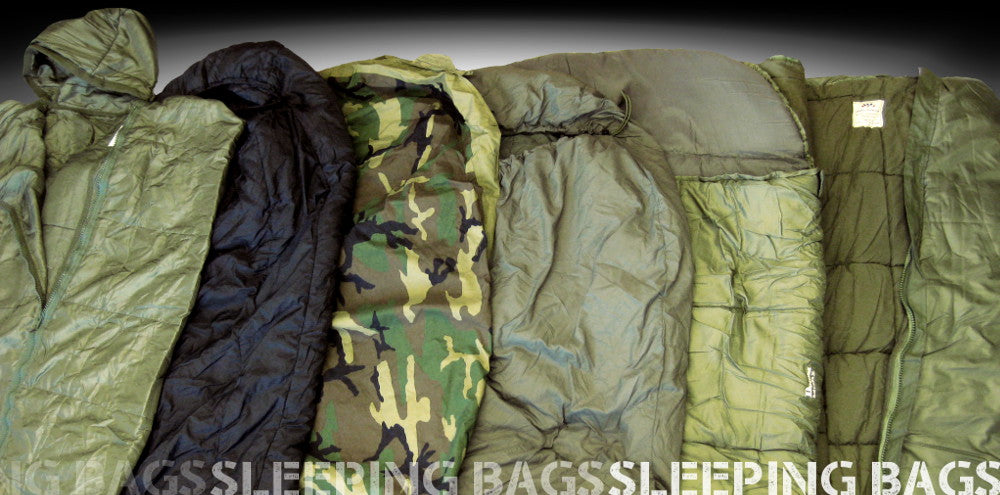A decent sleeping bag is an essential piece of kit, both for outdoors and for travel. If you’ve got a really good quality sleeping bag, you can get away with just using a fly or improvised bivi to sleep under, even in winter.
The first thing to consider when choosing a sleeping bag is: what will you use it for? If it’s for camping, travel, sleeping in your car, or not-too-strenuous hiking adventures, then you really want to invest in a good four-seasons sleeping bag. Remember: if you get too hot you can always unzip the bag, but if you get too cold you’re in serious trouble.
If you’re a serious hiker and need to keep the weight down in your pack, then you might consider a lightweight option. Cheap lightweight sleeping bags tend to be no better than a thin blanket, but the high quality ones really deliver a warm night’s sleep in a compact package. If the temperature gets lower than expected, you can always double up by sleeping in your hiking clothes. It’s a smelly option, but it will keep you alive.
The third option with sleeping bags is the bivi bag. These are a kind of all-in-one item if you don’t want to carry both a tent and a sleeping bag. They will keep you warm and dry in the morning dew and even heavy rain. If you’re in monsoon conditions you’re probably still going to get damp though, because the zips and seams will let a bit of water in if they get saturated. A great option for the hard-core off-track hiker, but they definitely don’t have the comfort and storage space of a real tent.

The next thing to think about is the materials your sleeping bag is made of. The outer should be a durable, lightweight synthetic material, usually polyester. You’ll probably have your sleeping bag a long time – a good one will last decades – so make sure it’s not going to get ruined by a stray twig puncturing it on your first trip. In the event that it does get ripped, good quality materials are easier to sew up.
Down and feathers are a popular inner material for sleeping bags. There is good reason for this: down is nature’s insulator. If it can keep ducklings warm in the Dunedin winter, it can keep you warm too. But there are some downsides. Down doesn’t like to be compressed over long periods of time. Storing a down sleeping bag in its cram sack between trips will compress the feathers and make them less effective. It also doesn’t like getting wet. Rain or condensation seeping into your down sleeping bag will cause the feathers to clump together and lose their warmth, and it takes a long time to dry it out.
Fortunately, modern synthetic sleeping bags are top-notch. You can get high-quality lightweight synthetic sleeping bags for pretty decent prices. They dry out quickly, and some of them even have Gore-tex to wick the moisture away from you.
Whatever you do, don’t cheap out. A sleeping bag is an investment that will last a long time and might just save your life.





4 comments
Army and Outdoors
Hi there Sarah. If he is sleeping outdoors he will probably need a bivi bag as well as a sleeping bag. A bivi bag is a waterproof bag that slips over a sleeping bag, providing protection from the rain. The ‘US Cold Weather Sleeping Bag’ and ‘USGI Woodland Bivi Bag’ make a fantastic waterproof, cold weather combo. If there is already protection from rain, the ‘Bushmate 3 Season’ is great for medium to warm temperatures and the ‘Black Ice 4 Season Sleeping Bag’ is perfect for all year round.
To find any of these sleeping bags, new and used to suit budgets, check out our sleeping bag range. http://www.armyandoutdoors.co.nz/collections/sleeping-bags-blankets, Thanks for your question.
Sarah
Im looking for a sleeping bag for my nephew is going on a cadet camp and is sleeping outdoors without a tent and I said I would get him a sleeping bag which is the best one to get
Army and Outdoors
Hi Lenny, have a look at our sleeping bag collection http://www.armyandoutdoors.co.nz/collections/sleeping-bags-blankets for a range of prices. Thanks for your question.
Lenny
Hi there how much are your survival sleeping bags can you please send prices to me thanks.